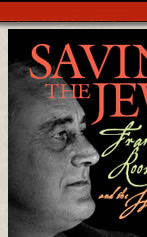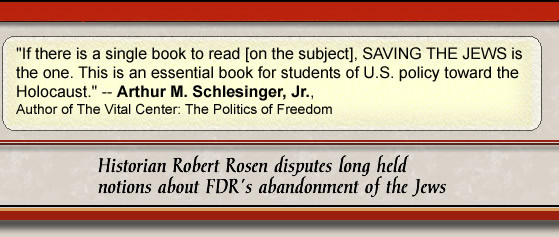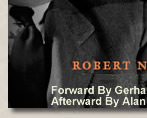




|
Reviews |
|
|
|
|
|
|
Why I Wrote The Book |
|
|
Excerpts |
|
|
Table Of Contents |
|
|
Auschwitz |
|
|
SS St. Louis |
|
|
Timeline |
|
|
A Survivor Speaks Out |
|
|
Carter Center Speech |
|
|
Justice At Nuremberg |
|
|
Purchase |
|
|
Related Links |
Why I Wrote "Saving the Jews: Franklin D. Roosevelt and the Holocaust"
By Robert N. Rosen
The Jewish Press October 25, 2006
In April 2001, I visited my daughter Ali, then a fifteen-year-old student at Phillips Academy in Andover, near Boston. We went to the Holocaust Memorial near Quincy Market in downtown Boston, and I was taken aback by a seemingly innocuous but in fact outrageous statement engraved in stone: “By late 1942, the United States and its Allies were aware of the death camps but did nothing to destroy them.”
I knew that, in 1942, the Allies lacked the ability to destroy the Nazi death camps. Over lunch, this Jewish American father explained to his Jewish American daughter that the United States was not even a belligerent in World War II until the attack on Pearl Harbor on December 7, 1941, and that our armed forces and citizens, I believed, were woefully unprepared for war at that moment.
I told Ali that in 1942, President Roosevelt began fighting what, for Americans, appeared to be a desperate multifront war against brutal Japanese militarists in the Pacific and a triumphant Nazi Germany and Fascist Italy in Europe and North Africa. We strove mightily, I explained, to save Great Britain, the Soviet Union, and all of Europe from the German juggernaut.
“But why didn’t we try to save the Jews?” Ali asked.
“FDR did the best he could,” I told her.
But was I right?
After five years of research, I found the main charges against the Roosevelt Administration – FDR’s alleged “abandonment of the Jews” and “complicity in the Holocaust” – were not true. On close examination, the charges of the Roosevelt decriers fall apart.
For example, take the charge that Jewish refugees onboard the S.S. St. Louis, which sailed from Hamburg to Cuba in May 1939, were returned to Europe to die in the Final Solution. I examined the records of the State Department. Our diplomats tried to convince the Cuban government to allow the passengers to disembark in Havana. When that failed, the Roosevelt administration cooperated with the American Jewish Joint Distribution Committee (“The Joint”) to save the passengers from returning to Germany. One-third of them disembarked in Great Britain, the remainder disembarked in Antwerp. None were returned to Germany.
Yet most American Jews today believe a fairy tale: that the S.S. St. Louis left the shores of Miami and sailed to Hamburg where the passengers were taken off to extermination camps. It was June of 1939. World War II had not begun. The Final Solution had not begun. Auschwitz had not been built. Two-thirds of the S.S. St. Louis passengers survived the Holocaust. No one knew in June 1939 that Hitler would reach into France, Belgium, and the Netherlands three years later in 1942 and deport Jews.
I also examined fairy tale number two: Roosevelt and American Jews were silent about the Holocaust. When the Final Solution began in the Soviet Union in June of 1941, it was not clear at first that the Nazis were bent on the extermination of the Jews. It did become clear by the fall of 1942. Roosevelt publicly denounced these atrocities on numerous occasions. He warned the Germans of “fearful retribution” in August 1942. He warned of war crime trials in October.
On December 17, 1942, in a declaration downplayed by FDR’s critics, the Allies condemned “in the strongest possible terms this bestial policy of cold-blooded extermination” of “the Jewish people in Europe.” This United Nations Declaration on Jewish Massacres was published on the front page of the New York Times.
Those who claimed there was “a conspiracy of silence” were wrong on both counts. There was no conspiracy, and Roosevelt certainly was not silent. Neither were American Jews who protested, held memorial services, and demanded action.
The bombing of Auschwitz turned out to be another red herring. Very few Jewish leaders asked the British and American governments to bomb the camps. Most Jewish groups and leaders opposed the bombing of Auschwitz for the obvious reason that if the camps were bombed, the Jews in the camps would die. On June 1, 1944, the Jewish Agency Executive in Palestine voted 11-1 against asking the Allies to bomb Auschwitz.
“It is forbidden for us to take responsibility for a bombing that could very well cause the death of even one Jew,” one member said. The World Jewish Congress consistently told the Department of War and the War Refugee Board that it was opposed to bombing “as the first victims would be the Jews who are gathered in these camps.”
On August 16, 1944, representatives of all of the major Jewish organizations in the United States met with John Pehle, Director of the War Refugee Board, and agreed that Auschwitz should not be bombed. The reports of the meeting reflect that Pehle was “extremely skeptical that any Jews would be permitted to leave Hungary.” (The Nazis were determined to kill them.) Asked about bombing the camps, “Mr. Pehle … said that a proposal to bomb the facilities had been objected to by Jewish organizations because it would result in the extermination of large numbers of Jews there…”
For reasons beyond the scope of this essay, it has become fashionable in the academic world to bash America. An articulate and persistent group of historians and activists insists, even in the face of this overwhelming evidence, that Americans were “accomplices of the Nazis,” that we were silent, that we did nothing, that “the American Jew” in the words of Rabbi Haskel Lookstein, “could not stand up proudly … his natural posture was bowed and bent.”
They claim that leaders of Jewish groups, on record in writing opposing the bombing, somehow whispered in someone’s ear to bomb the camps. The Jewish Agency Executive, the World Jewish Congress, Hadassah, B’nai B’rith, the American Jewish Committee all knew how to write a letter or send a telegram if they believed it was the right thing to do.
The Jewish boys who fought the Germans at Anzio Beach, at Normandy, and in the Battle of the Bulge were neither “bowed” nor “bent.” Nor were American Jews cowards. Five hundred fifty-thousand American Jewish men and women who proudly served in the United States armed forces helped to defeat the Nazis and end the Holocaust.
Hitler’s goal was not to kill 6 million Jews but to kill every Jew in the world at that time – 18 million of them. He failed, in great part, because of the heroic efforts of Franklin D. Roosevelt.
I wrote Saving the Jews to set the record straight.